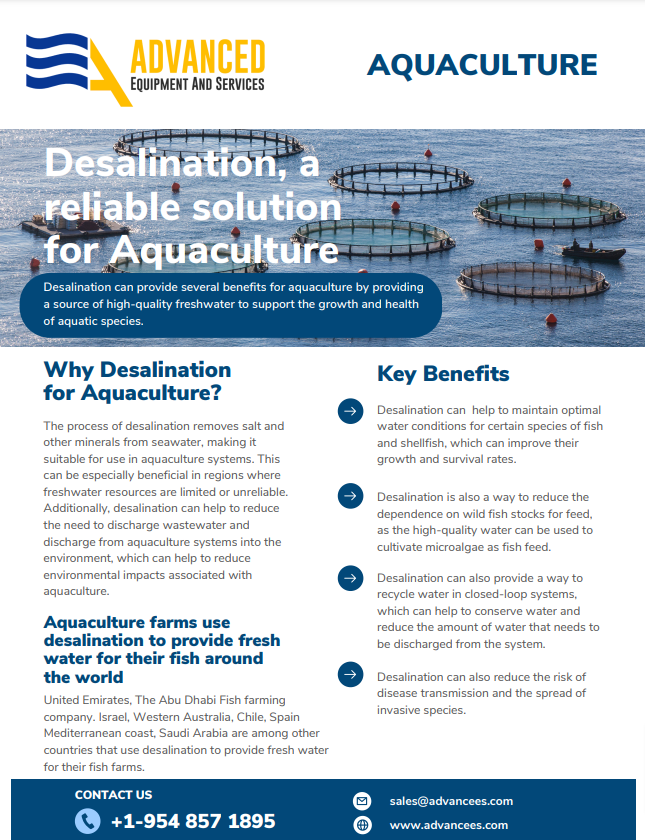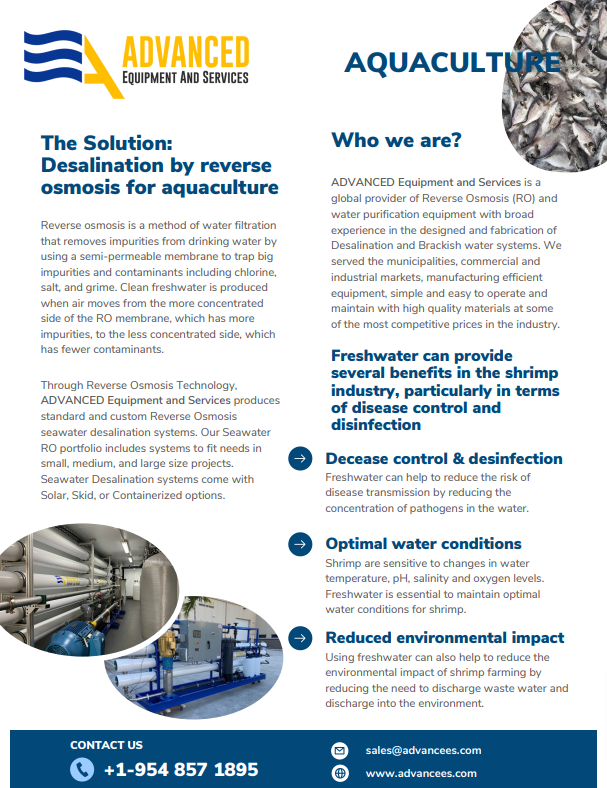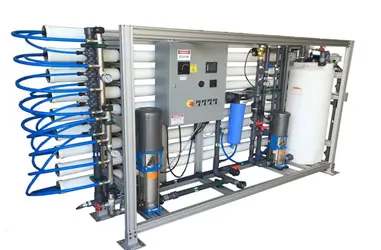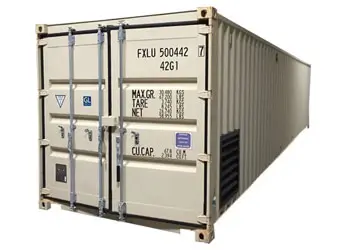Desalination a reliable solution
for aquaculture
Desalination provides a dependable source of clean, high-quality freshwater essential for aquaculture operations. By delivering consistent water quality, it supports the healthy growth of fish, shrimp, and other aquatic species while reducing the risks associated with poor or contaminated water sources. In shrimp farming specifically, desalinated water helps improve disease control, enhances biosecurity, and ensures better conditions for disinfection, ultimately leading to stronger yields and healthier stock.
We offer a complete line of solutions as follow:
Desalination can provide several benefits for aquaculture by providing a source of high-quality freshwater to support the growth and health of aquatic species.
Water quality plays a crucial role in agriculture, as it directly affects crop yield, livestock health, and the overall sustainability of farming operations. Poor water quality can lead to reduced crop yields, lower quality produce, and an increased risk of waterborne diseases in both humans and animals. Contaminated water can also have a detrimental impact on the environment, affecting aquatic ecosystems and wildlife habitats. Therefore, it is essential to ensure that irrigation water is free from harmful contaminants, such as suspended solids, bacteria, and viruses, to maintain optimal water quality. By prioritizing clean water, farmers can safeguard their crops, protect their livestock, and contribute to a healthier environment.
Benefits of Desalination for Aquaculture
- Desalination can also help to maintain optimal water conditions for certain species of fish and shellfish, which can improve their growth and survival rates.
- Desalination is also a way to reduce the dependence on wild fish stocks for feed, as the high-quality water can be used to cultivate microalgae as fish feed.
- Desalination can also provide a way to recycle water in closed-loop systems, which can help to conserve water and reduce the amount of water that needs to be discharged from the system.
- Desalination can also reduce the risk of disease transmission and the spread of invasive species.
Freshwater benefits
Refreshing fishpond water on a regular basis is an exceptionally efficient way of preventing and combating salmon lice and amoebic gill disease (AGD). Because of its low energy usage, it really provides an environmentally friendly alternative to chemical treatments.
Disease Control
Shrimp are susceptible to a variety of diseases, and maintaining optimal water quality is essential for preventing and controlling outbreaks. Freshwater can help to reduce the risk of disease transmission by reducing the concentration of pathogens in the water. According to a study published by the Journal of Aquatic Animal Health, the use of freshwater can reduce the incidence of disease by up to 75%.
Disinfection
Freshwater can be used to disinfect and sanitize shrimp culture systems, which can help to reduce the risk of disease transmission and improve the overall health of the shrimp. This can be done by using chlorine or other disinfectants, which can be added to the water to kill harmful bacteria and viruses. According to a study by the Journal of World Aquaculture Society, the use of chlorine can reduce the bacterial load in shrimp culture systems by up to 99%.
Optimal water conditions
Freshwater is essential to maintain optimal water conditions for shrimp. Shrimp are sensitive to changes in water temperature, pH, salinity and oxygen levels. The use of freshwater can help to maintain these conditions and provide a suitable environment for the shrimp to grow and thrive. According to a study by the Journal of World Aquaculture Society, the use of freshwater can improve the growth rate of shrimp by up to 25%.
Reduced dependence on wild fish stocks
Freshwater can be used to cultivate microalgae as fish feed. This can help to reduce the dependence on wild fish stocks for feed, which can help to reduce the environmental impact of shrimp farming. According to a study by the Journal of World Aquaculture Society, the use of microalgae as fish feed can reduce the dependence on wild fish stocks by up to 50%.
Closed-loop systems
Freshwater can be used to recycle water in closed-loop systems, which can help to conserve water and reduce the amount of water that needs to be discharged from the system. According to a study by the Journal of World Aquaculture Society, the use of closed-loop systems can reduce the water consumption by up to 70%.
Reduced environmental impact
Using freshwater can also help to reduce the environmental impact of shrimp farming by reducing the need to discharge waste water and discharge into the environment. According to a study by the Journal of World Aquaculture Society, the use of freshwater can reduce the environmental impact of shrimp farming by up to 90%.
Get the Right Aquaculture Water Filtration System
Reverse osmosis is a method of water filtration that removes impurities from drinking water by using a semi-permeable membrane to trap big impurities and contaminants including chlorine, salt, and grime. Clean freshwater is produced when air moves from the more concentrated side of the RO membrane, which has more impurities, to the less concentrated side, which has fewer contaminants.
Through Reverse Osmosis Technology, ADVANCED Equipment and Services produces standard and custom Reverse Osmosis seawater desalination systems. Our Seawater RO portfolio includes systems to fit needs in small, medium, and large size projects. Seawater Desalination systems come with Solar, Skid, or Containerized options.
Our entire, plug-and-play water desalination system is built to last in distant locations. It has the ability to produce large amounts of fresh, purified water from seawater.
Get a Free Consultation – Ensure access to clean, reliable water! Download your Catalog Here


Aquaculture & Reverse Osmosis Systems
In the world of aquaculture, sustainability and technology are key. With growing demand for seafood, operations in aquaculture face the challenge of supplying water with a high purity level for the proper development and wellness of aquatic species. Reverse osmosis (RO) technology is a powerful tool, providing high-purity water for application in aquaculture.
How Reverse Osmosis Works in Aquaculture
Reverse osmosis is a water purification process that uses a semi-permeable membrane to remove impurities from water. By applying pressure to a solution, RO separates contaminants including salts, minerals, and organic compounds from the pure water stream. This results in clean drinkable water for various applications including aquaculture.
Aquaculture-specific RO systems remove impurities, dissolved solids, and bacteria in water, creating an environment conducive to aquatic life. By providing high-purity water free of detrimental compounds, RO systems stimulate ideal growth rates, reduce aquatic organism stress, and maximize overall productivity in aquaculture.
Benefits of Reverse Osmosis in Aquaculture
Superior Water Quality for Aquaculture
The biggest advantage of using RO systems in aquaculture is the water quality they produce. By removing contaminants at the molecular level, RO systems produce water that meets the strict standards required for fish and shrimp farming. Pure, high-oxygen water aids in providing the best-ever health, growth, and reproduction of aquatic animals, translating into yields and heightened profitability.
Prevention of Waterborne Diseases
Waterborne pathogens are a major threat to the health and viability of aquaculture stocks. RO systems act as a defense against diseases by removing bacteria, viruses, and parasites from the water. By reducing the risk of disease outbreaks, RO systems safeguard the integrity of aquatic operations, minimizing loss and ensuring long-term viability.
Environmental Sustainability
The environmental impact of aquaculture is increasingly becoming a cause for concern, and its stakeholders are, therefore, looking for environmentally friendly alternatives. RO technology contributes to conservation efforts through effective use of water and reduced discharge of effluents into aquatic environments. RO technology aids in conserving water and reducing environmental pollution, helping to meet compliance requirements and making aquaculture more sustainable.
Customized Reverse Osmosis Solutions for Aquaculture
Each aquaculture farm will have its individual water management requirements and challenges, and individualized solutions must therefore be designed. Consulting with experienced professionals who specialize in aquaculture RO systems is crucial for delivering a system that is designed, installed, and operated in a manner specific to the farm’s unique needs. Customized solutions optimize performance, reduce operational costs, and maximize the benefits of RO technology for aquaculture ventures.
Ongoing Support & Maintenance for RO Systems
The successful integration of RO systems in aquaculture operations requires continuous maintenance and upkeep. Partnering with reputable suppliers that offer comprehensive support services ensures the reliability and performance of RO systems. With routine maintenance, problem-solving, and upgrade capabilities, expert maintenance maximizes RO infrastructure life and performance, providing peace of mind for aquaculture operators.
The Importance of Reverse Osmosis in Aquaculture
The global demand for fish and aquatic produce is driving rapid expansion in the aquaculture industry. To maintain optimal water quality, commercial reverse osmosis (RO) water systems are now essential to ensure the health, growth, and productivity of aquatic species. RO systems are a reliable method to eliminate impurities and maintain a clean water supply in aquaculture facilities.
Water Quality Affects Aquatic Life
Water quality plays a significant role in the survival, growth, and health of aquatic species. Water with impurities and contaminants can cause aquatic species to fall ill, develop at a reduced pace, and experience increased mortality rates. RO systems eliminate these risks by producing high-purity water free from heavy metals, excess nutrients, and pathogens.
Applications of RO Systems in Aquaculture
Aquaculture facilities—such as hatcheries, nurseries, and grow-out areas—can benefit from commercial RO systems. These systems can be customized for different aquaculture applications to meet the specific water quality requirements at each stage of production.
How Reverse Osmosis Works in Aquaculture Facilities
By applying pressure to push water molecules through a semi-permeable membrane, RO purifies water by removing impurities. Salt, microbes, and other contaminants are effectively removed through the membrane, with only clean, pure water passing through.
Health Benefits for Aquatic Species
- High-purity water enhances aquatic species’ resistance to disease and overall health.
- Removal of contaminants like heavy metals, nitrates, and bacteria reduces disease and mortality rates.
- Healthier aquatic populations lead to higher yields and better profitability.
Growth & Feed Efficiency
- Aquatic species cultured in clean water experience increased growth and greater efficiency in food intake.
- The elimination of toxins helps enhance healthy metabolic processes, improving nutrient absorption.
- Faster growth and lower feed costs result in higher profitability for aquaculture operations.
Consistent Water Quality
- RO systems stabilize water conditions, reducing stress on aquatic species caused by fluctuating water quality.
- A consistent and controlled water environment improves overall health and minimizes stress-related disorders.
Advancing Aquaculture through Reverse Osmosis
For aquaculture, integrating commercial RO water systems provides access to high-purity water, which is essential for the well-being and productivity of aquatic species. The benefits of better water quality, faster growth, and environmental sustainability make RO technology a necessary tool in modern aquaculture. By investing in high-tech water purification, the aquaculture industry can achieve high standards of quality and long-term success and profitability in its operations.
We offer a complete line of solutions as follow:
What Is Reverse Osmosis in Aquaculture?
Reverse osmosis (RO) is a vital water purification process for aquaculture operations, ensuring that fish, shrimp, and other aquatic species thrive in safe and balanced environments. The process works by applying high pressure to force water through semi-permeable RO membranes, which allow clean water to pass through while rejecting salts, minerals, and contaminants. The purified water is called “permeate,” while the concentrated stream of rejected salts and impurities is known as “concentrate.” In aquaculture, RO systems can remove up to 99.5% of dissolved salts and harmful substances, helping farmers maintain water quality, control disease risk, and support healthy growth conditions.
WE ADAPT TO YOUR NEEDS!
We can customize our products to meet all your project needs. Take a look at these custom features:

SKID MOUNTED
Easy to transport and install, with a small footprint for reduced spaces

CONTAINERIZED
Work in the most harsh and corrosive conditions with our containerized systems

SOLAR / hybrid
Ensure operation with our full solar or hybrid system
Frequently Asked Questions (FAQs)
Why is reverse osmosis important in aquaculture?
RO systems provide high-quality water that supports healthy fish and shrimp growth, reduces disease risk, and improves overall yield.
Can desalination systems support shrimp farming operations?
Yes. Desalinated water helps control pathogens and provides a clean environment, which is especially valuable for disease prevention in shrimp farms.
What contaminants can reverse osmosis remove from aquaculture water?
RO removes salts, heavy metals, bacteria, viruses, and excess minerals that can harm aquatic species or disrupt water balance.
How does RO improve biosecurity in aquaculture?
By reducing harmful microorganisms and pollutants, RO creates a safer, more stable environment that limits disease outbreaks.
Is reverse osmosis suitable for both freshwater and saltwater aquaculture?
Yes. RO can be used to produce freshwater for inland farms or to control salinity in brackish and marine systems.
Can RO water be remineralized for aquaculture use?
Absolutely. After purification, water can be rebalanced with specific minerals to match the ideal conditions required by different aquatic species.
How does RO benefit hatcheries and breeding facilities?
Clean, controlled water improves egg hatching rates, larval survival, and the overall success of breeding programs.
Are RO systems scalable for large aquaculture farms?
Yes. ADVANCEES designs systems for small hatcheries through to large commercial farms, ensuring consistent performance at any scale.
Does reverse osmosis reduce operating costs for aquaculture businesses?
Yes. While it’s an investment, RO reduces losses from disease, lowers chemical treatment needs, and extends equipment life, leading to long-term savings.
Does ADVANCEES provide support for aquaculture RO systems?
Yes. We offer design, installation, maintenance, and technical support to ensure water treatment systems run reliably in aquaculture facilities.
Industrial Park Coral Springs
18514 Intercontinental Crossing Dr, Houston, TX 77073
Products
Latest Projects
 PROJECT DESCRIPTION – Sustainable Seawater Treatment – Coastal community and golf course facilitiesAugust 26, 2025 - 12:02 pm
PROJECT DESCRIPTION – Sustainable Seawater Treatment – Coastal community and golf course facilitiesAugust 26, 2025 - 12:02 pm PROJECT DESCRIPTION – MUNICIPALITY PLANT CONTAINERIZED MODULAR SWRO SYSTEMSJuly 3, 2025 - 4:03 pm
PROJECT DESCRIPTION – MUNICIPALITY PLANT CONTAINERIZED MODULAR SWRO SYSTEMSJuly 3, 2025 - 4:03 pm ADVANCEESPROJECT DESCRIPTION – HIGH TDS WATER RO SYSTEMJuly 21, 2023 - 11:47 am
ADVANCEESPROJECT DESCRIPTION – HIGH TDS WATER RO SYSTEMJuly 21, 2023 - 11:47 am
